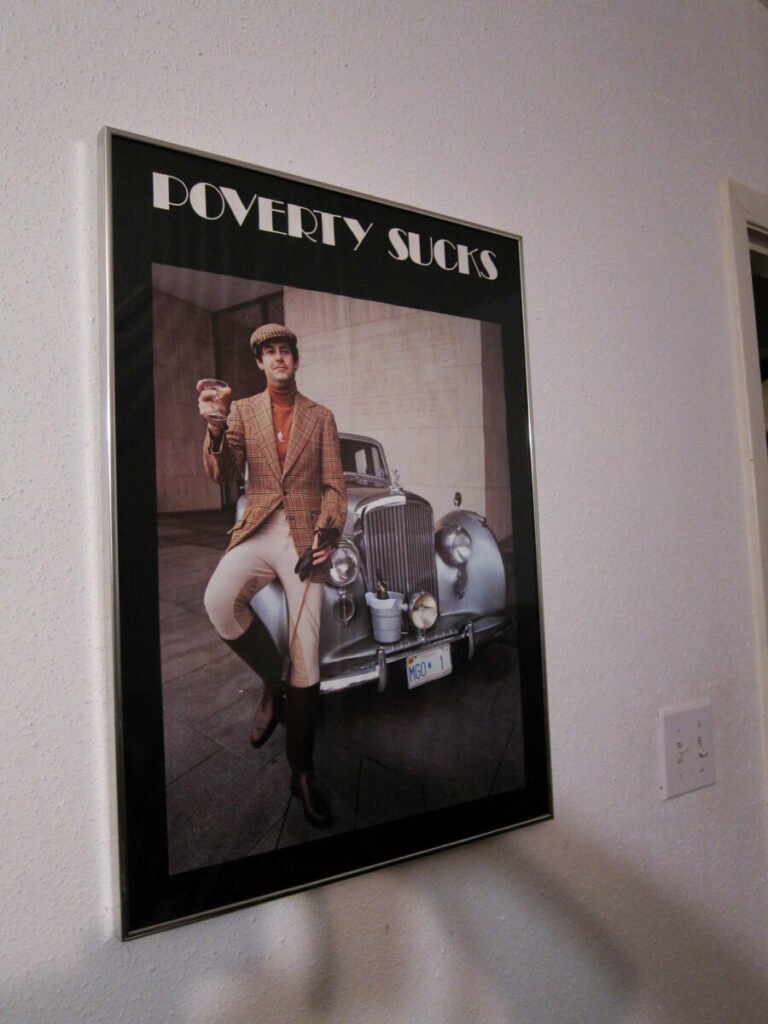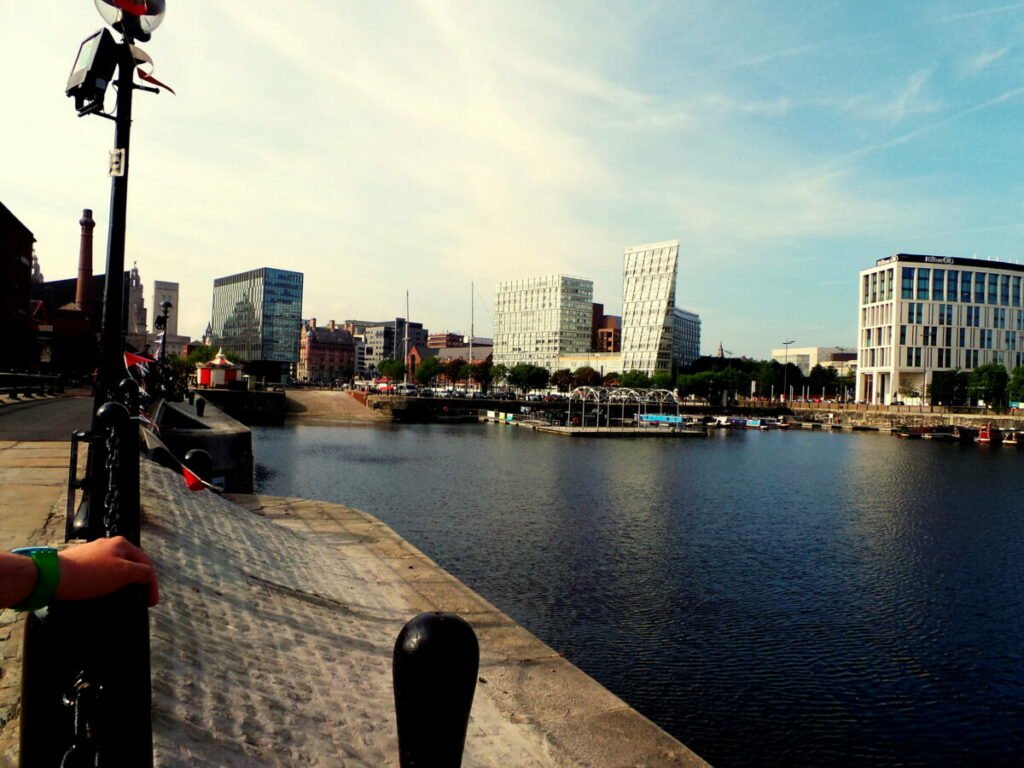Framed on my mother’s real estate office desk was a small poster from the ‘80s. Twenty years later, it was still there in a space where a family portrait might have been. It pictured a well-coiffed woman with a sarcastically smug aristocratic sneer, a champagne glass in one hand and a riding strop in the other, dressed as to the manor born: tweed jacket, cravat, English riding pants and knee-length boots, one resting on the bumper of a Rolls Royce, parked in front of some grand estate. The image illustrated the caption: Poverty Sucks.
This poster was iconic of a decade infamous for its excesses, when Madonna celebrated “living in a material world” and bumper stickers insisted “Whoever Dies with the Most Toys Wins.” There were actually his-and-her versions of the poster. Mom had bought me the men’s edition while I was in high school, and for a while it papered the backside of my bedroom closet door. But by the time I saw Mom’s on her desk, mine had long since been discarded with other accoutrements of a privileged youth–for which The Official Preppy Handbook was both a touchstone and a satirical spoof.

Mom’s gift of that poster was the only lesson she conveyed to me about poverty. The only explicit one, to be more precise. Without well-articulated positions on economics or politics, her social commentary was limited to brief and unfiltered editorials on liberal lawmakers, most of whom were dismissed as “silly twits.” Why that was, she never explained. She said nothing about wealth disparity, solidarity, human dignity, or even, God forbid, noblesse oblige. Only after she died did I realize she avoided speaking about poverty, because she had been born into it. Hers was a silence born of shame.
My childhood proddings managed to squeeze from Mom only minimal details about her English origins. While she’d reluctantly admit to having been born in Liverpool, she was quick to insist that her birthplace was near Aintree, “where they run the Grand National”—a major annual steeplechase event in a Liverpool suburb. It’s a bit like the Kentucky Derby with fancy hats, fancy drinks, and lots of gambling. I think Mom thought this sounded respectable, maybe even a little bit posh. Because there’s not much posh about Liverpool. And there’s certainly nothing posh, as I would learn, about where in Liverpool she was born.
As to where that was I had no idea until I sorted through her things after she died. Neglected in the attic was a shoebox-sized plastic bin, taped firmly shut, covered in dust, and obviously untouched for years. Inside was a chaotic collection of artifacts from a young English life in the 1950s. Amidst all these vignettes of forgotten stories was a birth certificate, carelessly folded like a grocery list jammed into a pocket. It wasn’t the original but a copy, issued in 1958, not long before Mom left England for the United States. Some of its scant information I already knew. Date of birth? February 2, 1934. Sex? Girl. Name? Pauline. But why, I wondered, was the place of birth not a hospital but a simple street address: 107 Rice Lane, Liverpool?
Mom wasn’t the only person born at 107 Rice Lane, as a little online sleuthing quickly uncovered. Paul McCartney was born there too, as evidenced by souvenir copies of his birth certificate from the height of Beatlemania. For a few glorious moments, the starry-eyed fan in me imagined Mom and one of the Fab Four having been born in the very same house. Did our families know each other? Were they friends? Of course! Step aside, Billy Preston. Move over, Brian Epstein! My mom is the Fifth Beatle! But a few more mouse clicks destroyed those fantasies. 107 Rice Lane wasn’t a private home; it was Liverpool’s Walton Hospital. And it had begun its existence, not to care for the sick, but to institutionalize the impoverished. It had been the community workhouse: the West Derby Poor Law Institution.
Until then, my only passing familiarity with workhouses had been the famous, pathetic plea of Charles Dickens’s fictional orphan, Oliver Twist: “Please sir, may I have some more?” Dickens had railed against grim workhouses, and from what I learned I can understand why. They crisscrossed Victorian England when all poverty was attributed to laziness, vice, or both. As the only form of public assistance, workhouse conditions were intentionally harsh, to deter and punish. Those who entered—“beggars,” “vagrants,” the addicted and mentally ill, unwed mothers shunned by their families—typically had no other alternatives. Living in a workhouse was a supreme disgrace; those who did were scorned as the dregs of society.
Workhouses looked and operated like prisons. “Inmates” lost their right to vote, surrendered their possessions upon entering, were forced to wash under supervision, and issued coarse uniforms to be worn at all times. Men and women—including husbands and wives—were segregated to prevent “breeding.” Children were separated from their parents, who were deemed unfit for having wound up impoverished. Family members were forbidden from speaking with each other. Accommodations were cheerless and spartan. Meals were meager and tasteless. Long days were filled with hard labor and compulsory prayers. As a small token of mercy, workhouse names were omitted from birth certificates of babies born there, to save them from later shame.
Ultimately, public horror over workhouse conditions led to their demise. By the time they were abolished, many workhouses were largely infirmaries for the destitute sick and aged. Some were converted into hospitals to continue housing those already living there, who had nowhere else to go. That’s how Liverpool’s West Derby Poor Law Institution became Walton Institution Hospital and finally Walton Hospital, four years before my mother’s birth. But everyone remembered what Walton Hospital had been, and the shame of association remained. As during the workhouse days, its name was omitted from birth certificates. Like that of Paul McCartney. And Mom.
The home address on the birth certificate was located a few miles from the Aintree Racetrack, making Mom’s claims plausible, although a bit of a stretch. Yet that same address placed her within easy walking distance of Liverpool’s docks, the heart of a gritty seafaring city infamous for its soul-crushing poverty. Unemployment there reached thirty percent during the Great Depression—precisely when my mother was born. This was the city she was ashamed to be associated with. Her birth certificate may have spared her from any permanent connection to the old workhouse; she would spare herself from any permanent connection with Liverpool.
The Old English roots of “Liverpool” mean “muddy pool”—an apt description for a city then filled with slum tenements of shabby brick rowhouses, encased in black from the accumulated soot of seaport grime and countless coal fires. It was a world of rough characters, rampant crime, communal outhouses, broken windows, garbage-strewn gutters, open sewers and vermin, and damp filthy air choked with smoke and grease. The city’s Latin motto, Deus Nobic Haec Otia Fecit, means “God Hath Granted Us this Ease,” which at the time could have been taken as either wishful thinking, a perverse attempt at gallows humor, or an ironic commentary on the “ease” imposed on those without work. It was not a city that engendered pride for anyone who lived there; it was a city that elicited ridicule from those who did not. Many who could manage to leave did so. including my grandmother, listed on that birth certificate as a “domestic servant,” who migrated to London with my young mother in tow.
Those who remained enjoyed some civic pride when Paul and the other “lads from Liverpool” skyrocketed to international fame as the Beatles. Liverpool was suddenly cool. But not in Mom’s eyes. For her, Liverpool was irredeemable. True, she was no giddy teenager at the advent of Beatlemania. But even if she’d wanted to claim some bragging rights, she had no direct Beatles connections. Her home had been on the other side of town from where the Beatles grew up. She didn’t play near Strawberry Field or get pushed in a pram down Penny Lane. Paul’s mother Mary, immortalized in “Let it Be,” was possibly a delivery room nurse at Walton Hospital when Mom was born there, and my great-grandmother Ellen is buried in the same cemetery as John Lennon’s mother Julia, about whom he sang on the White Album. But these tenuous associations would have meant nothing to Mom. She shunned any association with Liverpool—Beatles or no Beatles.
As for the Beatles themselves, Mom declared them crass and uncouth, and their signature moptop haircuts a disgrace. I still recall her revulsion when glimpsing a made-for-TV movie about them. While they were rehearsing in unpressed jeans and t-shirts, some stiff-suited executive was led in to see the band play. With a cheeky “Fancy a chip, mate?” Paul’s character offered a soggy french fry blackened by the newspaper that wrapped it. The executive refused; my mother recoiled at what she saw as cocky insolence. Yet Mom also owned an album with orchestral performances of Beatles’ songs. They wrote beautiful music, she explained. She just couldn’t stand their voices. As “lads from Liverpool,” they spoke like they were from Liverpool. For Mom, that was a deal breaker. It echoed her own Liverpool roots, which she was so keen to deny.
In the England of Mom’s day, one was judged by how one sounded. Accent didn’t just reveal where you were from; it also indicated class. Whether or not one spoke the “King’s English” distinguished the high-born from the low and where one fit in British society. This culture is pilloried in My Fair Lady, the famous musical. A lead character, Professor Henry Higgins, wages that he can pass off a course-tongued slum dweller as an aristocrat, simply by changing the way she speaks. His test case was Eliza Doolittle, an East London Cockney who sold flowers outside the Royal Opera House at Covent Garden. “Look at her, a prisoner of the gutter,” sneered Higgins, “condemned by every syllable she utters.” As was typical for her background, Eliza didn’t pronounce her “aitches”—the letter “h” at the beginning of words. But after long hours and many tears, Eliza could triumphantly declare that “in Hartford, Hereford, and Hampshire, hurricanes hardly happen!” She’d learned to pronounce her aitches. And Professor Higgins won his bet.
Mom also learned to pronounce her aitches, somehow. Like Eliza Doolittle, Mom had lived in East London—Hackney, to be specific, with plenty of poverty and England’s largest community of Hasidic Jews, some of whom paid Mom to light their coal fires on the Sabbath. Also like Eliza Doolittle, Mom had a connection with Covent Garden. But Mom hadn’t been outside with the flower-sellers. Mom had made her way inside. Along with her birth certificate in that dusty box of souvenirs was a Covent Garden playbill from 1953. And that’s unusual. Liverpool-born daughters of housekeepers from Hackney didn’t typically attend the Royal Opera House. But Mom aspired to something else. Or at the very least, she feared what might be her fate if she didn’t. So she learned to conceal her origins, and speak the King’s English. That was the first necessary step in climbing up the social ladder.
But that ultimately wasn’t enough. In the rigidly class-conscious British society in which one was still expected to “keep to their station” and “remember their place,” there was always a chance of Mom being outed as a working-class commoner. I imagine she feared this at school. Mom was clever, as the English say, and had won a scholarship to the Skinner’s Company School for Girls, sponsored by one of London’s ancient royal livery guilds, modestly entitled the “Worshipful Company of Skinners.” It’s likely there that she’d learned to pronounce those aitches. Her teachers may have drilled them into her. Or maybe she’d forced herself to do so through sheer willpower, seeking acceptance by her classmates at what other local children, who would have stopped school at age fourteen, mocked as “The Skinner School for Skinny Snobs.”
Living in Hackney with a maid mother and lighting the neighbors’ coal fires gave her nothing to be snobbish about at Skinner’s. Did she feel inferior and insecure? Did she struggle to keep up a facade, afraid her secrets might be uncovered, exposing her to ridicule and exclusion? The pretending must have been exhausting. While she was able to change her speech, she couldn’t change her origins. To leave those behind, she would need to leave England altogether. Which she did, at age twenty-four, having secured a job in Baltimore through friends.
The Beatles wrote a song inspired by a Skinner’s student: “She’s Leaving Home,” the sixth track on Sgt. Pepper. The girl had quietly slipped off one afternoon, and her father had gone to the papers to report her missing. Paul McCartney read the story, wrote the song, and correctly surmised that the girl had just been longing for adventure. She returned after ten days. But when my mom finally left home, she wasn’t just looking for adventure. She was looking for a clean slate—a chance to form an entirely new identity across an ocean where Liverpool wasn’t a byword, her roots weren’t a liability, and people were charmed by every sort of English accent —aitches or no aitches. She did not return in ten days. She would not return for thirty-one years.
In Baltimore she worked for the Aston Martin Motor Company, helping sell James Bond cars to Americans quite pleased to receive their English imports from an English expat. Those sports cars led her to California where the sun always seemed to shine, unlike gloomy London, and “People wore colors!” as Mom was fond to say—a contrast to dowdy English wardrobes. She would meet there a newly-commissioned naval officer who, after three dates, would propose by telegram while at sea. They would be married for fifty-eight years. And, in contrast to how she was born, she did not die in poverty. She’d lived one Englishwoman’s remarkable version of the American dream.
That dream began with the deck stacked in her favor, as the country to which she emigrated is in love—both then and now—with the one she left behind. Americans swoon over English accents. Americans adore the Royal Family—palace intrigue and all. And unlike Mom, most Americans still like the Beatles, even forty years after they broke up. Immigrants from other cultures couldn’t benefit from this sort of adulation. They’ve been met with fear, discrimination, and hostility as they struggled to settle, learn a new language, and stay connected to their roots. Some even changed their names on arrival to sound more English. Because that’s what was necessary to fit in, and move up.
American society has been described as a caste system—a hereditary hierarchy that determines which lives matter most, and assures that access to power, prestige, and social capital is as much a matter of race, as it is of merit. For much of our nation’s history, at the pinnacle of this pecking order were WASPs—White Anglo-Saxon Protestants. Over time, this top tier expanded to include anyone identified as white—including the typically Catholic Germans, Poles, Slavs, Italians, and Irish who had once been on the outside, looking in. At the bottom have always been people of color, especially those Blacks who endured, not the struggles of assimilation, but the inhumanity of bondage.
My mother’s England had a caste system too. It was based, not upon race, but upon class. Although I wasn’t aware of it at the time, it was embedded in a song I sang in church as a boy: “All Things Bright and Beautiful.” It’s a classic English children’s hymn, still in rotation today. Its second line, “All Creatures Great and Small,” inspired the title of a beloved series of novels and TV adaptations about the charming misadventures of a fictional Yorkshire vet. But the hymn’s original version in 1848 contained an uncharming verse that won’t be found in any hymnal today:
… …The rich man in his castle,
… …The poor man at his gate,
… …God made them high and lowly,
… …And ordered their estate.
The verse’s message was unmistakably clear: one’s place in society, high class or low, wasn’t arbitrary or somehow unjust. It was part of God’s design.

By Mom’s day, England had changed since that hymn was written. But the class structure was still very much intact. Many accepted it, with indifference or grudging resignation. Others tried to game the system, pretending to be something they weren’t. Some railed against it in righteous indignation. But Mom didn’t fight it. She fled from it, erasing a past to chase a different future. In effect, she traded one caste system for another in which she had a greater chance for success, and one she could leverage to her own advantage. Because in America, any English accent would do just fine, and it didn’t matter if Mom’s blood wasn’t blue. What was most important was that her skin was white.
Realizing this helped me understand why Mom had that dreadful poster on her desk. The caption was autobiographical, while the picture was aspirational. It wasn’t just making a statement. It was masking a shame—shame over a past she denied but kept fragments of hidden in a dusty box, with a birth certificate that tried to keep her secrets too. While she lived, I would have loved to have heard more about her roots, and mine. And I would have benefited from some healthy parental lessons about poverty, beyond being given a poster that mocked it. Ironically, I work now for an organization that fights poverty. More than ever, I appreciate that poverty sucks. But I wish Mom had told me that herself. She assumed I would have been ashamed. She never guessed that I might have been proud.

Share this post with your friends.

